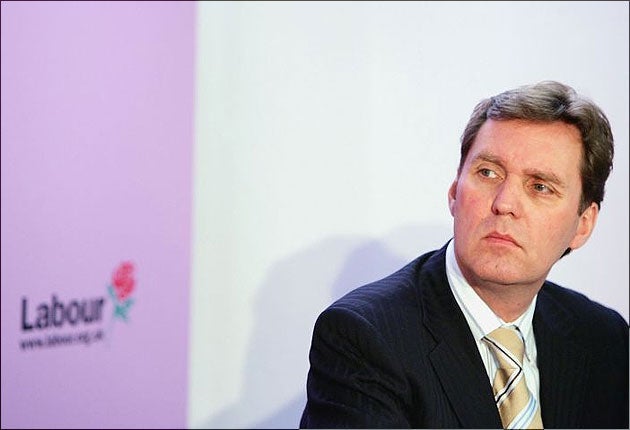Milburn tells PM: Don't betray Blair
Former health secretary warns party against lurching to the left

Alan Milburn, the former cabinet minister, has warned Gordon Brown not to abandon Blairite policies and urged him to change his personal style by replacing "monologue" with "dialogue".
Writing in The Independent today, Mr Milburn says "the old top-down approach to governance will no longer work". He believes the Prime Minister's focus on the economy has left a dangerous void on other domestic policy issues, and he predicts that Labour will lose the general election expected next year unless it develops a wide-ranging, forward-looking agenda. The former health secretary appeals to Mr Brown to reject pressure from some allies to respond to the financial crisis by lurching to the left.
He declares that properly regulated markets, capitalism and globalisation are good. In a jibe at what critics see as Mr Brown's control freakery, Mr Milburn calls on him to change the culture of Labour Party politics and to follow Barack Obama's lead by adopting an open, engaging politics "that favours dialogue over monologue".
The intervention of Mr Milburn, the MP for Darlington, will increase the pressure on the Prime Minister after a disastrous few weeks. He adds to the criticism levelled at Mr Brown by former ministers including David Blunkett, Charles Clarke, Stephen Byers and Frank Field, and the attack on the Government's "lamentable" communications by the Communities Secretary Hazel Blears.
Blairites are alarmed by a speech by Mr Brown on Tuesday in which he attacked the Conservative Party for supporting "market forces" to raise standards in schools. They fear that it signalled a retreat from the public service reforms championed by Tony Blair, and could leave the field clear for the Tory leader David Cameron to promise to complete them.
In his article, Mr Milburn argues that the challenges facing Labour can no longer be met by "a mix of extra resources and top-down reforms", saying citizens must be empowered and services made accountable to local communities – who could take over the running of children's centres, estates and parks.
Mr Milburn denies that the Blairite approach is redundant following the collapse of the banks, and believes "more, not less, New Labour" is needed. He fears the Government may throw out the baby with the bathwater by seeking more state control. "The left must avoid the trap of countering an argument about less state by making a case for more state," he writes. "The job of progressives is not to kill capitalism but to civilise it – by making it work in the public interest."
Last night, Mr Brown's allies admitted that the need to respond to the economic crisis had diverted attention from other issues, but insisted that the Prime Minister accepted the need to develop a wider policy agenda in order to win a fourth term in office. They strongly denied that he was moving away from Mr Blair's reforms.
Harriet Harman, Labour's deputy leader, rebuked former ministers such as Mr Milburn for criticising the Prime Minister, saying they risked wrecking Labour's general election prospects. She said they should stop being "political pundits" and added: "We don't want anybody who is part of Labour's team in Parliament giving people the impression we are anything other than completely focused on giving the help they need at this time."
Yesterday, Mr Brown endured an uncomfortable session of Prime Minister's Questions, in which he was ridiculed by Mr Cameron over Ms Blears's searing criticism in a Sunday newspaper article. The Tory leader, who renewed his call for an immediate general election, questioned why Ms Blears was still in the Cabinet.
Claiming that the Government was in "terminal decline", he suggested that Mr Brown was now "the issue" on the doorsteps and isolated within his own Cabinet. "You are the only one who thinks you are any good," he told the Prime Minister.
Mr Brown, noting that Mr Cameron did not mention policy issues in any of his six questions, told the Tory leader: "You are completely out of your depth when it comes to the big issues."
Later, the Prime Minister held a 30-minute private meeting with the actress Joanna Lumley, leader of the campaign to secure greater residence rights for Gurkha veterans – on which he suffered his first Commons defeat last week. Afterwards, Ms Lumley said she trusted Mr Brown to "do the right thing" and he would "come up with a new solution by the end of this month". But Downing Street insisted Mr Brown had made no commitment to speed up the Government's response, which is due by July.
Lord Mandelson, the Business Secretary, accused Mr Cameron of talking the British economy down by speaking about "an age of austerity" and warned that this could jeopardise the recovery. "This attempt to make us feel worse about ourselves may have an understandable electoral motivation. But its effect, if we are not careful, will be felt beyond politics," the peer said in a speech in London.
"If insecurity breeds economic hopelessness, we risk cutting ourselves off from the economic opportunities and growth markets the world economy offers us. Sapping our nation's will to succeed won't help us win in global markets."
Join our commenting forum
Join thought-provoking conversations, follow other Independent readers and see their replies
Comments
Bookmark popover
Removed from bookmarks